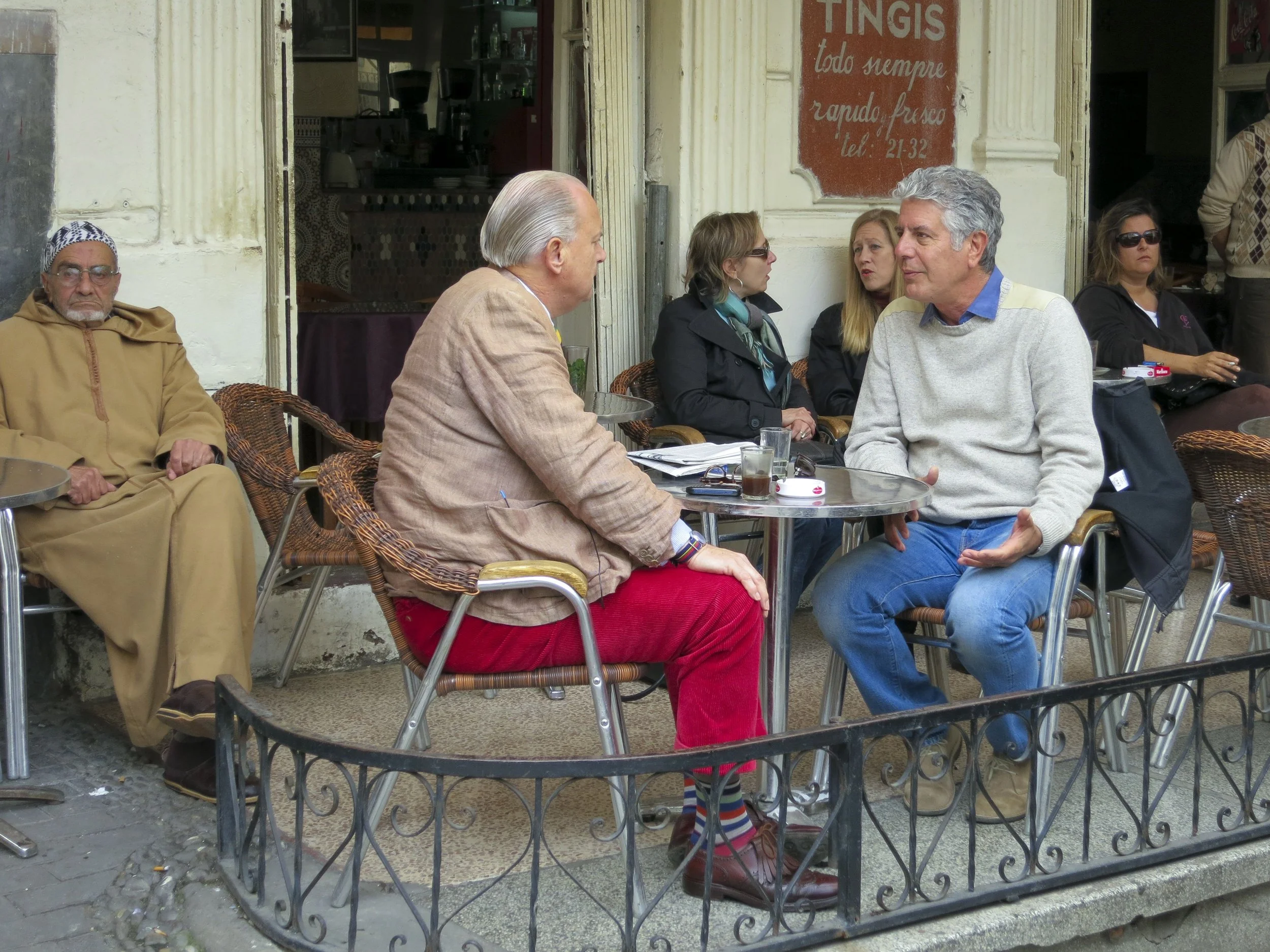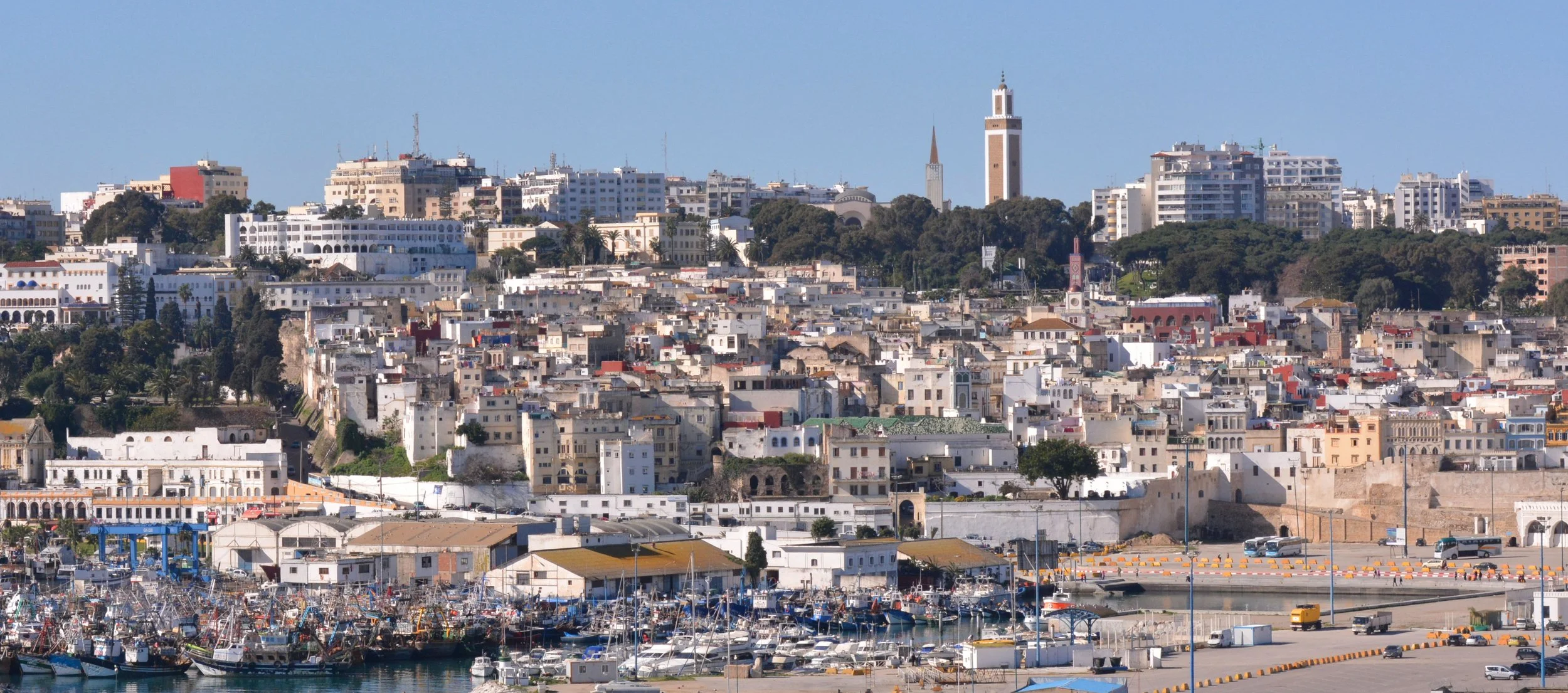parts unknown, revisited- an examination of bourdain’s work
Bourdain in Tangier (photo owned by CNN)
When I finished Anthony Bourdain’s memoir Kitchen Confidential, my immediate thought wasn’t, “dang, kitchens are nasty,” or “shoot, I want to be a chef;” like most readers, my first thought was: “where can I get more of this guy?”
I’ve read a ton over the last few weeks (Yay, senior spring!); I’ve read classics like A Picture of Dorian Gray, philosophical books like The Stranger and Siddhartha, and modern masterpieces like On Earth We’re Briefly Gorgeous. Each impacted me in a unique way. But no book captivated me more than Kitchen Confidential. There’s something incredibly charming, but, more importantly, something incredibly genuine, about Bourdain’s writing and persona. In his storytelling, no matter how outlandish or depraved, there’s an always-present sense of dignity and respect. Yes, he lists 35 different ways to call a sous-chef a ***********, but he also describes the sense of love and loyalty that’s required to use those terms. He doesn’t just make you want to have wild and exciting experiences, he makes you want to have them the right way: with dignity, respect, and a big appetite.
Parts Unknown is a documentary series following Anthony Bourdain’s travels around the world which aired on CNN from 2013-2018. In it, Bourdain explores both the culinary scenes and historical context of several regions around the world, eating with and interviewing local chefs, artists, etc. If you haven’t watched it, you should; it’s informative and mouth-watering. I was most intrigued by the episode which takes place in Tangier, Morocco. To note, I don’t talk about food very much in this review. But trust me, watch the episode in question- it’s there. Beautiful tomato dishes, coffee, an incredible omelet, goat cheese with flat bread; Moroccan food looks incredible, and it’s now on my extensive “food to try” list. Rather than being about food, though, this essay is more about culture and how we enjoy it.
Whereas Bourdain’s exploration of other countries follows the distinct experiences of the native population (for example, the episode in Libya follows the perspectives of the revolutionaries who overthrew Gaddafi), the episode in Tangier follows the experiences of white Europeans who have moved to Morocco in search of adventure. The episode presents a very relevant issue in traveling, which is the view held by many wealthier travelers of “exotic” and “exciting” lands as outlets for their own personal enlightenment and adventure.
The episode in question focuses heavily on the impact of Paul Bowles, an American expatriate writer who lived in Tangier for 52 years and wrote about his life as an American living in the city, exploring the supposed lawlessness of the culture and government. Bowles, and later the Beat Generation, viewed Tangier as an escape from Western tradition. Tangier had accessible drugs, and a rich, novel culture; William S. Boroughs wrote that “Tangier is one of the few places left in the world where, so long as you don’t proceed to robbery, violence, or some form of crude, antisocial behavior, you can do exactly what you want.” Beat poets such as William S. Burroughs and Jack Kerouac, incredible writers in their own right, traveled to Tangier in search of inspiration. Bowles is regarded in the episode by Bourdain to be the first and most admirable of these adventurers. He wrote about drug use, adventure, depravity; new sights and sounds and people. Many other “free souls” followed suit. The episode in question follows a few of those people; older white Europeans who have long since adopted Tangier as their home.
Our first introduction to these peculiar characters is to an older British gentleman living in a nice apartment. This man is like something out of a parodic movie about British colonization- he strolls around Tangier, going from coffee shop to coffee shop, reveling in the “exotic background” (as said by Bourdain) and clearly displaying an internalized romanticism of the city. Later in the episode, we’re introduced to several similar elderly people, all having fantastical stories about following Bowles’ dream to a far-away land.
I want to note that these residents do not express a sense of cultural imperialism or desire for colonization of Tangiers. One woman acknowledges that “Tangier is theirs (the native population) and they have allowed me to live here in a very nice way.” I don’t think there’s something inherently wrong with the notion of exploration and cultural appreciation, and there’s something charming and admirable in these peoples’ willingness to embrace other lands. However, the episode also explores the expatriots’ disdain for the direction of Tangier today. Interestingly, these cultural “explorers” regard Tangier as having slowly lost culture over time, and lament the loss of the “old” city. Paul Bowles himself felt that Tangier was being ruined by outside commercialism, writing in 1963, “there is nothing left to spoil.” Bowles and others thought that Tangier has slowly been losing its’ own nature, a sentiment that may be entirely accurate and is shared by many Moroccans. However, the fact that the travelers disdain the cultural direction of Tangier, and speak of it becoming “tame,” is questionable to me. There seems to be a lack of appreciation for the fact that an increase in tourism and development, two areas of “modernization” which could potentially serve to diminish the prominence of a place’s native culture, likely stem (at least in part) from the popularized view of Tangier as an “exotic escape” for rebellious Westerners. The episode touches on this idea, with Bourdain acknowledging the hypocrisy and self-contradiction of the whole ordeal; tourists want to use Tangier as a backdrop for the “movie inside their head,” utilizing the exciting nature of a new cultural backdrop, without recognizing their own role in commercializing the city; they revel in the culture, hoping that Tangier will never change, never grow, so they can continue playing the “rogue.” Bourdain says,
“You can well imagine the American guy who’s lived in Tangier for 30 years, coming into the coffee shop and seeing a flatscreen TV and saying, “you’ve ruined the authenticity and integrity.” But the Moroccan guy at the next table says, “wait a minute, a**hole, you have a flat screen TV at home. I want one too.”
Yes, it’s good that travelers appreciate Tangier, and appreciate its culture- but if they only view it as a backdrop for their own personal exploits and “exotic” exploration, then can their appreciation really be characterized as genuine?
Parts Unknown will go down as a great work of travel documentation and culinary exploration. Like any good piece of media, it should make us think. In our own travels, we must acknowledge our own motivations for exploration. Do we want to enjoy a culture and city, or do we want to use the location as a backdrop for our own narrative? If the answer is the latter, it doesn’t mean we need to stop traveling, but we should certianly always work to appreciate a landscape, rather than exploit it; to embrace a culture, rather than force it to stay the same for our own fulfillment; and to enjoy the world, rather than try to control it. If you read this far, thanks for tuning in. See you next time.

